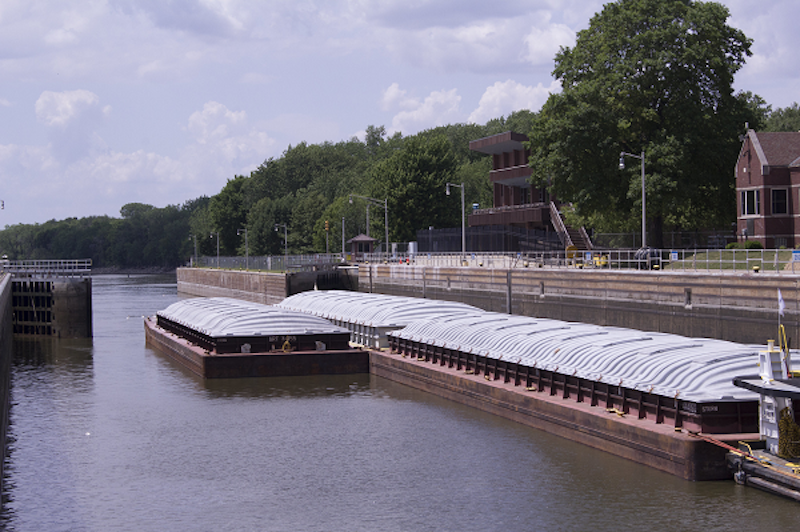A much-anticipated three-month closure of parts of the Illinois Waterway for major repairs to aging navigation infrastructure gets underway tomorrow, July 1, and will run through the end of October.
The shutdowns will affect barge traffic through this major waterway, which carries more than 29 million tons of cargo each year — mainly agricultural and industrial products — and consists of rivers, lakes and canals that provide a shipping link between Lake Michigan and the Mississippi River.
Closures will run from 60-120 days, depending on the work being done.
The Corps of Engineers, which oversees the closures and repair work, said neither the pandemic nor recent high water along the river are expected to affect the project’s schedule going forward.
All locks along this waterway have a single lock chamber for passing vessels. At 80-90 years old, this infrastructure is well beyond its lifespan and needs extensive repairs. The barge and agricultural industries, which have long sought the upgrades, say improvements will speed river transport times and assure lock and dam reliability.
The Corps has chosen to do a consolidated repair schedule that began in 2019 with short closures and continue this year and again in 2023 with longer shutdowns. Closures are being done simultaneously to lesson impact on commercial barging, and to avoid spring flooding and fall harvests.
LaGrange lock and dam will close from July 1-Sept. 30, Peoria Lock and Dam from July 6-Sept. 30, Starved Rock from July 1-Oct. 29, Marseilles Lock from July 6-Oct. 29, Dresden Island partially from July 6-Oct. 3 and Oct. 12-Oct. 28 and fully Oct. 4-Oct. 24.
The Brandon Road lock and dam, located on Des Plaines River in Joliet, Ill, was scheduled for this year but put off until 2023 to stagger the work and impose fewer burdens on the barge industry, said Allen Marshall, spokesman for the Corps’ Rock Island District. “Lengthy closures during back-to-back years is hard on the navigation industry. The decision to stagger the work was a coordinated decision.”
The barge industry has been working for more than a year with shipping customers on ways to keep commodities moving, and plans are in place for the closures.
“The routine conversations (with customers) have allowed us to have a deliberately planned and executed program to support their needs in the region,” said Mason Eustis, director of operations at Canal Barge, New Orleans. “We were able to pre-position equipment into Chicago in advance of the closure and get the excess towboat horsepower off the river before the shutdown.”
Merritt Lane, CBC’s president and CEO, said the planning process involved breaking down “a very big problem into measurable and manageable pieces. There is only so much that can be done in advance, so we really focused on laying groundwork for decision-making during the critical few weeks ahead of the shutdown.”
Lane said redeploying vessels is a challenge, but “CBC has leveraged our partnerships with other customers that trade elsewhere, supporting their needs and keeping the horsepower occupied through the closure.”
Mark Knoy, president and CEO of American Commercial Barge Line, said with long lead times, shippers and carriers have worked through logistics and inventory issues, and when possible commodities are being inventoried and stored or moved by truck or rail.
“I think it will be non-event in the current scheme of things,” he said “The longer-term concern is service realities for our shipping customers, and this closure and investment will go a long way towards improving the delivery of their products.”
Deb Calhoun, acting CEO and president of the Waterways Council Inc., which advocates in Washington for inland infrastructure funding, noted that the barge industry is experienced with river closures and had a taste of disruptions on the Illinois when it was closed for 83 days last year, along with the Upper Mississippi, due to flooding. “Shippers and operators got through that unexpected closure and they will get though this planned closure,” she said.




